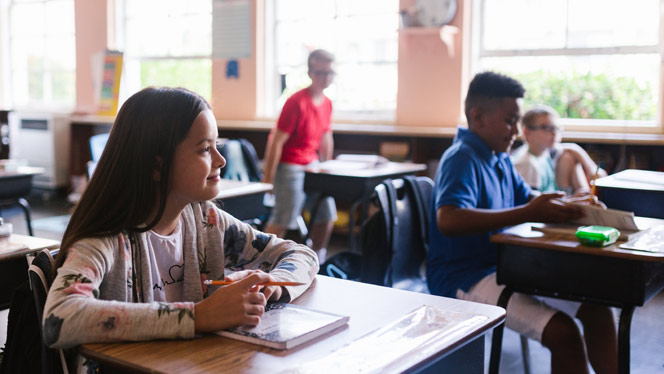Tips for Effectively Returning to School
NHA Communications TeamNHA Communications Team
Articles by NHA Communications Team
-
Uncommon Tips for Children Starting Kindergarten
Published: Aug 02, 2023
As we are returning to in-school learning after an extended time away, it’s vital that we begin to prepare now in order to make sure that all systems are “go” once that big day arrives. Gloria McDaniel-Hall, Ed. D., senior curriculum and instruction specialist, offers several tips.
Dr. McDaniel-Hall, based in Chicago, has been with NHA since 2008. She was the founding principal at Aspire Charter Academy, became a director of school quality in 2010, and served as the principal and eighth-grade math teacher at North Dayton School of Discovery two years ago.
She’s also an assistant professor at National Louis University in Chicago in the Educational Leadership Department, and was asked to do an interview for ABC 7 Chicago regarding tips for effectively returning to school.
Dr. McDaniel-Hall separates out her suggestions for a safe return into three buckets: psychological, physical, and education-focused ways to prepare. She begins with the psychological – although all three of these areas are extremely important, and some of these suggestions could land in multiple categories.
Psychological:
Physical:
Education-Focused:

Dr. McDaniel-Hall, based in Chicago, has been with NHA since 2008. She was the founding principal at Aspire Charter Academy, became a director of school quality in 2010, and served as the principal and eighth-grade math teacher at North Dayton School of Discovery two years ago.
She’s also an assistant professor at National Louis University in Chicago in the Educational Leadership Department, and was asked to do an interview for ABC 7 Chicago regarding tips for effectively returning to school.
Dr. McDaniel-Hall separates out her suggestions for a safe return into three buckets: psychological, physical, and education-focused ways to prepare. She begins with the psychological – although all three of these areas are extremely important, and some of these suggestions could land in multiple categories.
Psychological:
- Parents – take care of yourselves. Make sure you have someone with whom to process your feelings. You can’t help others for very long if you don’t take care of yourself first.
- Prepare your child(ren) for the ways that school will be different. Most people really enjoy physical connections with others, so this may be a hard change to understand, especially for little ones.
- Ask your child(ren) how they are feeling about returning to school. Let them know that they can share all those feelings and you can help them process them or find a resource that can help. Anticipate that there may be things your child will initially struggle with in terms of classroom management and behavioral expectations. Ask what they are nervous or anxious about.
- For very little ones, it would be good to visit the school and their classrooms and have them meet and speak with their teachers, if possible. This should be done a few times before school begins.
- Ask a lot of questions. Connect with other parents if possible. Establish playdates, carpooling options, even get additional ideas for preparing to return. Try to maintain this circle of friends.
- Last, but not least – get excited! Discuss the positive aspects of returning.

Physical:
- Contact the school in order to determine the implication of social distancing directives within your school. Discuss how this will look with your child(ren).
- Be sure your child knows not to share things like pencils, water bottles, and other supplies with classmates.
- Practice safety habits such as coughing or sneezing into your elbow. Also, practice conversations from a distance. Practice wearing masks at home for a few hours a day.
- Check your child’s temperature each evening and morning. If they are demonstrating any symptoms, do not send them to school; however, make sure you have a way of getting any homework so that they don’t get behind in their work.

Education-Focused:
- Get back into the routines of school. Set times for waking up, eating, reading, and going to bed. It will make your lives so much easier if you both get back into the swing of things early. Use free resources from the Internet to get reading, writing, and art materials. Be positive, not punitive about this part.
- Set aside a “study time” starting now. During this time, remove distractions, such as the television, and focus on school-related activities. This time can then become homework time once school begins.
- If your school requires that students bring lunch, be sure to shop appropriately so that lunches can be prepared each evening.
- Go to your local teacher’s store or bookstore to purchase grade-specific summer learning books.
- Be sure to make use of your local library. The children’s librarians love to help. Check out books to use for your dedicated study times.
- Advise the teacher or leaders in your school if your child is experiencing difficulty with the transition once school begins.



